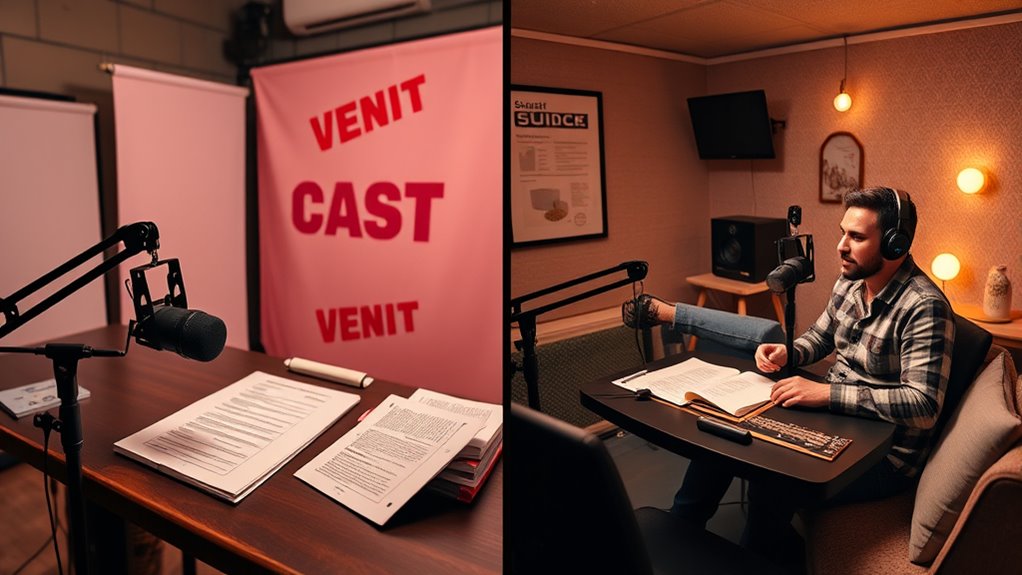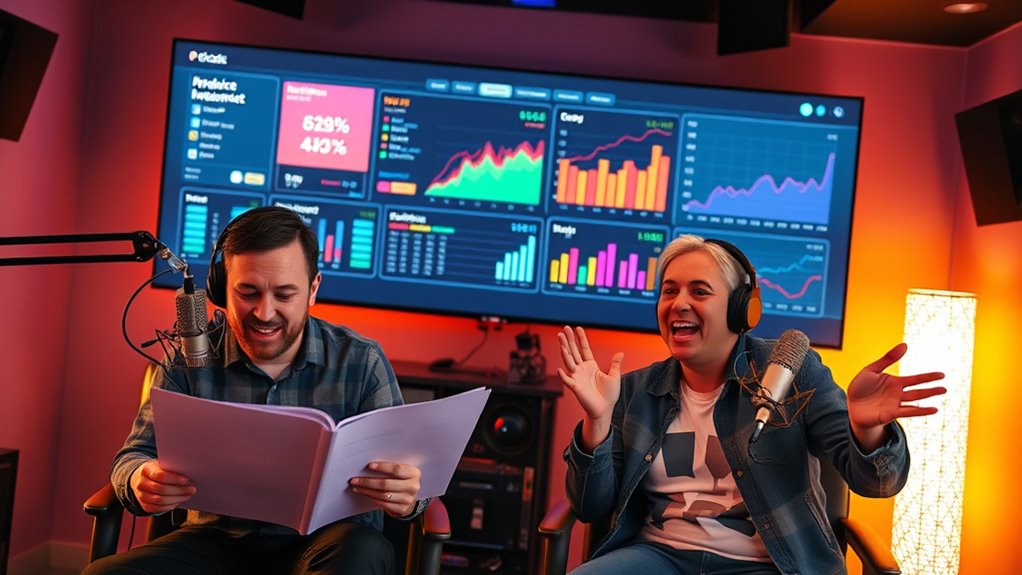Recent audience trends show listeners prefer authentic, unscripted podcasts that feel genuine and relatable, fostering stronger emotional bonds. However, scripted series still attract those seeking clear, well-organized storytelling, especially for complex topics. Your choice depends on your audience’s values—whether they prioritize authenticity or polished clarity. Understanding these preferences can help you create content that truly resonates. Keep exploring to discover more insights on how to align your podcast style with what listeners crave.
Key Takeaways
- Audiences increasingly favor authentic, unscripted podcasts for transparency and emotional connection.
- Scripted series are preferred for detailed storytelling and delivering complex information clearly.
- Authenticity in unscripted formats boosts engagement and encourages listener loyalty.
- Quality audio and editing enhance both formats, impacting perceived professionalism and listener retention.
- Content goals and audience values should guide the choice between scripted and unscripted approaches.

When choosing a podcast format, understanding the differences between scripted and unscripted series is essential. Your decision influences how you connect with your audience and how they perceive your content. Scripted podcasts are carefully planned ahead of time, with a clear script guiding each episode. This structure allows you to craft precise narratives, ensuring that your message stays on point. As a result, audience engagement tends to be consistent because listeners know what to expect. However, scripted content can sometimes feel less authentic if it’s overly rehearsed, making it harder for your audience to connect on a deeper level.
On the other hand, unscripted podcasts emphasize spontaneity and genuine conversation. When you opt for this format, you give yourself the flexibility to adapt and respond in real time, which often enhances content authenticity. Listeners value this honesty, feeling they’re part of an authentic experience rather than a polished performance. This authenticity can foster stronger emotional connections, encouraging your audience to stay engaged and return for more. That said, unscripted series require you to be comfortable with improvisation and rely heavily on your ability to steer conversations naturally, lest episodes drift off-topic or lack coherence.
Audience preferences are shifting, and many listeners now favor content that feels genuine and relatable. They’re more likely to engage with podcasts that showcase real conversations and authentic personalities, even if those episodes aren’t perfectly structured. This trend favors unscripted formats, especially for niche topics or communities that value transparency. Conversely, scripted podcasts excel when delivering complex narratives, detailed storytelling, or educational content, where clarity and precision matter most to keep your audience engaged.
Many listeners prefer authentic, unscripted podcasts that feel genuine and relatable.
Additionally, incorporating elements such as audio quality and engaging editing techniques can significantly boost the professionalism and appeal of either format, making your series more enjoyable. Ultimately, your choice depends on your goals and style. If you want to build a loyal community that trusts your authenticity, unscripted episodes might be your best bet. They allow your personality to shine through, making your content feel more personal. Conversely, if your focus is on delivering well-organized, polished content that’s easy to follow, a scripted approach might serve you better. Whichever route you choose, understanding what your audience values—whether it’s engagement or authenticity—will guide you toward creating a series that resonates and keeps listeners coming back for more.
Frequently Asked Questions
How Do Production Costs Compare Between Scripted and Unscripted Podcasts?
When comparing production costs, scripted podcasts often require higher budgets due to content planning, scripting, and post-production, whereas unscripted podcasts typically save on these expenses. Your production budgeting needs to take into account content flexibility; unscripted shows allow for spontaneous conversation, reducing costs. Scripted series involve more planning and editing, increasing overall expenses. By understanding these differences, you can better allocate resources and decide which format suits your budget and content goals.
Which Format Has Higher Listener Engagement Over Time?
You’ll find that listener engagement varies based on content and format, with scripted podcasts often fostering stronger listener loyalty through polished storytelling. However, unscripted series can boost engagement by offering content diversity and authentic conversations that keep audiences coming back. Over time, both formats can build loyalty, but scripted shows tend to sustain higher engagement levels due to consistent quality, while unscripted podcasts thrive on spontaneity and variety.
How Do Sponsorship Opportunities Differ for Each Type?
You’ll find sponsorship opportunities differ based on your podcast’s format. With scripted series, brand partnerships often focus on sponsorship integration within the narrative, creating seamless product placements that boost credibility. Unscripted shows, however, attract sponsors interested in authentic engagement, favoring direct mentions or host-read ads. Your choice impacts how sponsors connect with your audience, shaping the type and depth of sponsorships you can secure for your series.
What Are the Common Challenges Faced in Scripted Podcast Creation?
Imagine you’re building a delicate house of cards; each card represents a script development step. Your biggest challenge is balancing intricate storylines and casting talent that bring characters to life. You must carefully craft every scene, ensuring smooth collaboration and avoiding setbacks like talent availability or script rewrites. These hurdles test your patience and creativity, but with persistence, your scripted podcast can stand tall, enthralling listeners with its carefully woven narrative.
How Does Audience Demographic Vary Between Formats?
You’ll notice that audience demographics vary based on listener preferences and content diversity. For scripted podcasts, you often attract a younger, story-loving crowd who enjoy polished narratives and high production quality. Unscripted series tend to appeal more to adults seeking authentic conversations and real experiences. Recognizing these trends helps you tailor your content to meet your audience’s preferences, boosting engagement and expanding your reach across different demographic groups.
Conclusion
So, whether you prefer the polished perfection of scripted podcasts or the raw authenticity of unscripted ones, one thing’s clear: audiences are drawn to authenticity—even if it’s messy. Ironically, the less you plan, the more genuine it feels. So, go ahead, embrace the chaos or the carefully crafted script. Either way, your listeners will keep tuning in, proving that sometimes, the best stories are the ones you least expect—and probably didn’t plan.









